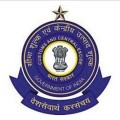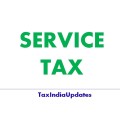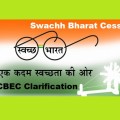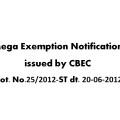Tax Benefits for Maritime Sector and Ease of Doing Business
In order to provide the Indian shipping industry a level playing field and make it competitive at international level, the government has earlier implemented certain policies. In recent the Government of India has proposed the some tax incentives in the Union Budget 2016-17 for strengthening and promoting the Indian maritime sector. The followings are major benefits which made available by Government to Maritime Sector:
Exclusion of services of transportation of import cargo by ships on voyage charter from Negative List.
Freight charged by shipping companies for import of goods into India has been excluded from the Negative List and permitted availment of CENVAT credit on inputs used for providing such service. This will bridge the competitive gap between Indian and foreign shipping lines in the taxation sphere.This positive change puts India on par with the major progressive maritime jurisdictions, which already give full credit of taxes paid on inputs used for import cargo.
Zero rating of services of transportation of export cargo by Indian ships.
The transport service for export of cargo was not being treated as export and CENVAT credit was also not available for export of goods, which made the service costlier for Indian flag ships.It has now been proposed that the services provided by Indian shipping lines by way of transportation of goods by a vessel to outside India shall be zero rated with effect from March 1, 2016 along with the availability of CENVAT credit for inputs used in providing the service. This will reduce transportation cost and put India at par with the major progressive maritime jurisdictions which have zero rates of taxation on maritime services and also provide full credit of taxes paid on inputs used in the maritime services.
Reduction of service tax incidence on coastal shipping.
Realizing the need for encouraging transportation of goods through coastal shipping rather than road or rail, the Government, in the Union Budget 2015-2016, had brought the abatement of service tax at par with road and rail i.e. 70%. However, due to lack of CENVAT credit on inputs used in the service in case the benefit of abatement is availed, the shipping companies were not able to provide services to the customers at lower costs.In the present budget, the Government has rectified this anomaly and allowed shipping companies to charge service tax at abated rate on freight income and avail CENVAT credit on input services.
Reduction of Central Excise duty on capital goods, raw materials and spares used for repair of ocean going vessels.
This would reduce the material cost used for repair of the ocean going vessels by 4%, if domestically procured.This amendment also permits the shipyards to procure capital goods for ship repair of ocean going vessels at NIL rate of duty as against the existing 12.5%.With the proposed amendment, cost of ship repair and dry-docking in India will reduce.
Simplification of procedure to avail Customs and Central Excise duty exemption on procurement of goods for shipbuilding and ship repair.
The procedure for procuring goods at concessional/NIL rate of Central Excise and Customs duty for the ship building and ship repair has been considerably streamlined. The new procedure only requires intimation to be sent to the Excise Department instead of their approval for procuring goods at a concessional/NILrate.This would enable the ease of doing business.
Parity between indigenously built ships and imported ships.
Government has on November 24, 2015 exempted Customs and Central Excise duty on inputs used in manufacture of ships to provide a level playing field between indigenously built ships vis-à-vis imported ships.
Ease of Doing Business for Indian shipyards.
Government has on November 24, 2015 relaxed the limitation to operate shipyards under customs control under Section 65 of the Customs Act, 1962 to avail duty free imports or domestic procurement of inputs used in shipbuilding.
Boost to movement of containerised cargo through coastal route.
Government has on September 17, 2015, exempted Customs and Central Excise duty leviable on bunker fuels, namely IFO 180 CST and IFO 380 CST, used in Indian flag vessels carrying a mix of EXIM, empty and domestic containers between two ports in India.This tax incentive will reduce operational costs of coastal transportation and will encourage growth of Indian tonnage as well as promote development of transhipment hub in India.
Parity for Indian seafarers employed on Indian flag ships vis-à-vis those employed on foreign flag ships.
Government has, on August 17, 2015, brought parity in the tax regime of Indian seafarers employed on Indian flag ships vis-à-vis those on foreign flag ships and mandated that the period of stay in India shall be counted as per the entries made in his/her Continuous Discharge Certificate (CDC).This would benefit around 35,000 seafarers presently employed on Indian flag ships. This would not only change the perception of Indian seafarers with regard to serving on Indian ships, but would also reduce the additional cost burden on Indian companies and help retain quality officers.
Simplification in collection and assessment of light dues.
E-payment of light dues was put in place on May 5, 2015. For the collection of light dues, a simplified mechanism has already been adopted on November 26, 2014 for container ships whereby collections shall be made on TEU (Twenty feet Equivalent Unit) basis instead of net tonnage basis. This would facilitate faster clearance of ships and reduce detention time of vessels for payment of light dues.
Promotion of e-governance for permissions.
- Facility for online application for chartering permission and for e-payment of requisite fee for the charterer has been introduced on December 8, 2015.
- Facility for online application for Multi-modal Transport Operator license and for e-payment of requisite fee for the operators has been introduced on November 30, 2015.
- Facility for online application and for e-payment of requisite fee for issuance of fresh CDC and renewal/replacement/duplicate CDCs has been introduced on June 15, 2015.
- Facility for online application for registration and for e-payment of requisite fee for the shipowners has been introduced on March 20, 2015.
- Facility for online application and assessment for the Certificate of Competency examinations has been introduced on January 12, 2015.
Source : Press Information Bureau, India
Other Post Related to Union Budget 2016-17
- Equalisation Levy
- The Income Declaration Scheme 2016
- The Direct Tax Dispute Resolution Scheme, 2016
- The Indirect Tax Dispute Resolution Scheme 2016
- Changes proposed Central Excise Law by Union Budget 2016-17
- CBEC TRU Circular for Excise and Customs Changes in Union Budget 2016-17
- Clarifications on Excise Duty imposed on Jewellery in union Budget 2016-17
- Changes proposed in Service Tax by Union Budget 2016-17
- Krishi Kalyan Cess
- CBEC TRU Circular on Service Tax Changes in Union Budget 2016-17
- Changes in Cenvat Credit Rules by Union Budget 2016-17
- Changes made in Direct Tax Law by Union Budget 2016-17
- Finance Bill 2016 Provisions Relating to Direct Taxes
- Highlights of Union Budget 2016-17
- Union Budget 2016-17







